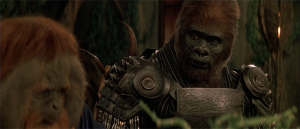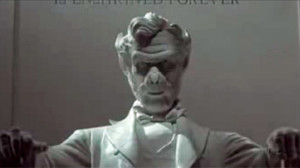In a lot of ways, Tim Burton’s Planet of the Apes is emblematic of the problems that befall remakes all too often. The original is dated in all the right places. It’s what you think of when you picture ‘60s sci fi in your head. Hammy acting, silly costumes, and a big twist ending. It stands out as a defining moment in its era and achieves a kind of timelessness. The 2001 remake trades the ‘60s camp for more contemporary trappings that felt tired before the first print made it to the theater.

It would be easy to dismiss this entry in the Apes series as just a lazy attempt to squeeze a bit more money out the long dormant franchise, but I think the truth is much more unfortunate. It was an excess of ambition that doomed this movie to its ultimate fate.
Fox wanted to relaunch the franchise, Tim Burton wanted to make something original that wasn’t a straight remake or sequel, and everyone with money on the line wanted it to come out in July 2001, no matter what corners would need to be cut to make that happen. No one compromised and the quality of the film suffered, but if you look closely, you can kind of see what they were trying to do.
Going in, Burton’s Apes had the same goal as Rise: reinvent certain aspects of the Apes cycle with a film that can lead to sequels and end years of inactivity in the series. Rise took a fairly straightforward approach; it took the story from one of the more fun entries in the series, Conquest, and grounded it firmly in reality. It was something that hadn’t been seen before. It was spectacular and it set things up for a potentially even better follow up.
The only downside was that it necessarily traded in the outlandish look and feel of its forbearers. Burton’s film made no such trade. It took elements from almost all of the earlier movies and combined them into, well, a giant mess. It tried make something new using only the same old ingredients and the result was embarrassing, but there is something admirable in the attempt.
It’s not hard to imagine what the flick could have been if only a few things had gone differently. Picture a Planet of the Apes that did the same things for Apes movies that Mars Attacks! did for UFO movies. The traces of this superior reality can be seen most clearly in the much maligned ending of the Marky Mark’s adventure.
There is a common misinterpretation of this ending that says it was an ill-conceived attempt to recapture the shocking twist of the original film’s ending. Tim Burton describes it differently on the DVD commentary. It wasn’t supposed to be a twist, it was supposed to be a cliffhanger that would lead directly into a sequel with Wahlberg stuck on contemporary Apeworld.

Think of where that could have gone! We could have had Conquest of the Planet of the Apes, but with the roles of Apes and humans reversed. Mark Wahlberg leading the human resistance against the tyrannical Ape society in a crazy alternate history version of 21th century Earth? That’s exactly the right kind of cheese for this franchise, but we never got to see it because it was just a few years short of the era of constant sequels.
Nothing stays dead any more. If more than three people see a movie, chances are it will be given a sequel and a TV series and a video game and a spinoff and a themed breakfast at Denny’s and a million other things. I don’t think that’s such a bad thing.
For every idea that exists, there is a way to do it right. It’s kind of beautiful that we live in a time where studios will keep trying and trying again until they get to that point where it’s done right, even if their motivation for doing so isn’t totally sound. What if we had given up on James Bond after critics hated Dr. No? Or Batman after Batman and Robin? Or Star Trek after The Final Frontier?
Go see Dawn of the Planet of the Apes and rest easy knowing that the problem you’re contributing to isn’t as dramatic as you might have thought. And go see the next movie and the next one after that. Even if they go bad, the potential for a great movie is always right around the corner.
